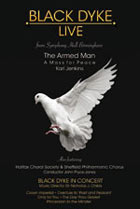 Black Dyke Band
Black Dyke Band
Conductor: Dr Nicholas Childs
Halifax Choral Society and Sheffield Philharmonic Chorus
Conductor: John Pryce – Jones
World of Brass WOB 143 DVD
To purchase this DVD: www.4barsrest.com/shopping/dvds_detail.asp
In modern parlance Karl Jenkins is probably regarded as a ‘crossover artist’, as happy writing in the classical medium (a recent spate of letters in The Daily Telegraph sought to clarify what the word ‘classic’ actually meant with no real answer) as well as for jazz, film and, more recently, brass band.
Success
Early successes were in the jazz field, moving into advertising music and then the success of ‘Adiemus’.
The classical side of his composition includes a harp concerto, a work for violin and his ‘Requiem’.
Gold disc
‘The Armed Man – A Mass for Peace’, which makes up the bulk of this DVD, was commissioned by the Royal Armouries and premiered at the Royal Albert Hall in 2000.
It has been performed more than 400 times and a CD gained a Gold Disc.
This version for chorus, brass band and organ was arranged by the Salvationist Andrew Wainwright and Duncan Gibbs as part of the final year of their music degree, and was premiered in 2005, with a second performance in May 2006.
The performance on this DVD was recorded in Symphony Hall, Birmingham in April 2010.
Commission
The commission was to mark the passing of the twentieth century: ‘the most war-torn and destructive century in human history.’
The obvious question of why record this on DVD and not CD was immediately answered as supporting the sound are chilling images of war, hatred and violence which are juxtaposed with human life and faith.
Impact
The impact is considerable as these images are a very vivid reminder of not only the horror of conflict but also of man’s desire for peace and hope.
Mind you, in fairness it is worth adding that both band and choirs look quite resplendent in the magnificent setting of Symphony Hall.
In ‘The Armed Man’, the brass band takes second place behind the voices.
Consequently, there can be no better conductor than John Pryce – Jones (who has a very impressive CV but has also worked with bands notably Yorkshire Imperial in the 1980s) and he ensures a good balance between band and choirs.
Gradual approach
There are thirteen movements. It is over an hour long opening with ‘The Armed Man’, the gradual approach of a marching medieval army.
Following this is the first solo, ‘Call to Prayers’, the Islamic call to prayer sung in Arabic.
Other movements use texts from the Bible, the Koran, Rudyard Kipling and poetry.
Better is peace
Blissfully, it concludes with ‘Better is Peace’, quoting the words of Sir Thomas Malory: “Better is peace than always war. And better is peace than evermore war.”
An unaccompanied anthem draws the work to a close ending with words from the Bible: “God shall wipe away all tears”, giving comfort to those most affected by war.
Not to dabble
This is not music to dabble with or dip into by selecting, say, just the Benedictus, the one movement which will be familiar to a banding public.
To do so is to fall into the trap of cherry picking and therefore losing the overall impact.
For this is worthy of and demanding of a hearing at one sitting and will leave you visually moved and quite probably emotionally drained.
Dyke in concert
The Jenkins is followed by Black Dyke in concert, although this part was actually the first half of the evening so something of a mystery why it was switched.
It would be fascinating to know whether this was a ‘brass band audience’, or a crowd out for the Jenkins who then had the chance to hear a brass band.
Probably a bit of both but more of the latter than the former I fancy.
A shame
A shame then that Dyke settled for a Sunday afternoon approach, unless the DVD contains only part of their programme.
No risks - Walton’s ‘Crown Imperial’, Suppe’s ‘Poet and Peasant’, ‘Only For You’ – a soprano solo from Paul Lovatt - Cooper, the hymn, ‘The Day Thou Gavest’ and Wagner’s ‘Procession to the Minster’, a blockbuster from the1980’s that has served bands well, but which has surely had its day?
Opportunity lost
This was a lost opportunity as there ought to have been room for at least one brass band original of real substance?
The Jenkins, though, is a triumph for all involved and a wonderful example of what brass bands can achieve, if they set their minds to it and look just a little beyond the end of their noses as Black Dyke have clearly done here.
Tim Mutum

The Armed Man — A Mass for Peace
Karl Jenkins has given us a modern version of an ageless evocation — and it works superbly well for brass band and choir.
Support us for less than a cup of coffee...
4BR wants to ensure that the brass band movement remains vibrant and relevant. We also want to be able to question, challenge and critically examine those who run and play in it, producing high quality journalism that informs as well as entertains our readers.
So if like us you value a strong, independent perspective on the brass band world - then why not consider becoming a supporter and help make our future and that of a burgeoning brass band movement more secure.
So one less cappuccino then?








